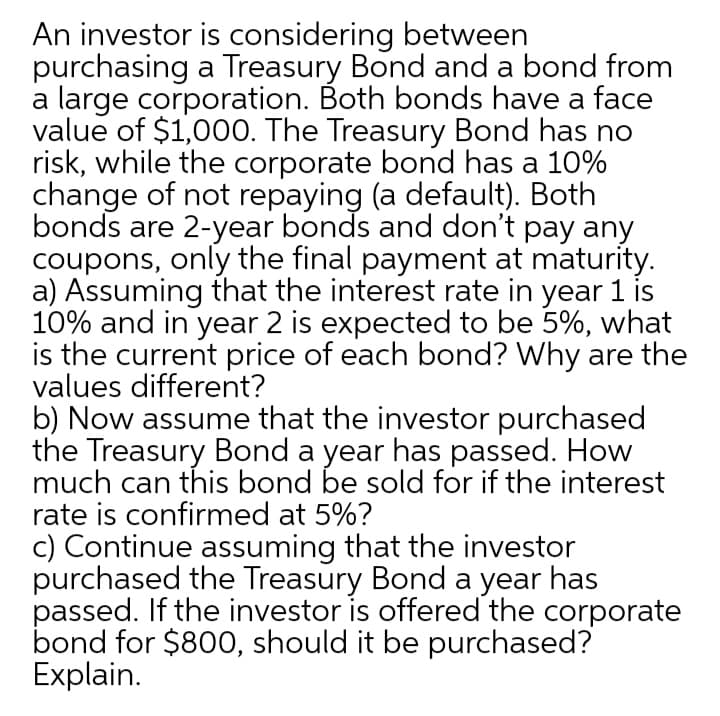An investor is considering between purchasing a Treasury Bond and a bond from a large corporation. Both bonds have a face value of $1,000. The Treasury Bond has no risk, while the corporate bond has a 10% change of not repaying (a default). Both bonds are 2-year bonds and don't pay any coupons, only the final payment at maturity. a) Assuming that the interest rate in year 1 is 10% and in year 2 is expected to be 5%, what is the current price of each bond? Why are the values different? b) Now assume that the investor purchased the Treasury Bond a year has passed. How much can this bond be sold for if the interest rate is confirmed at 5%? c) Continue assuming that the investor purchased the Treasury Bond a year has passed. If the investor is offered the corporate bond for $800, should it be purchased? Explain.
An investor is considering between purchasing a Treasury Bond and a bond from a large corporation. Both bonds have a face value of $1,000. The Treasury Bond has no risk, while the corporate bond has a 10% change of not repaying (a default). Both bonds are 2-year bonds and don't pay any coupons, only the final payment at maturity. a) Assuming that the interest rate in year 1 is 10% and in year 2 is expected to be 5%, what is the current price of each bond? Why are the values different? b) Now assume that the investor purchased the Treasury Bond a year has passed. How much can this bond be sold for if the interest rate is confirmed at 5%? c) Continue assuming that the investor purchased the Treasury Bond a year has passed. If the investor is offered the corporate bond for $800, should it be purchased? Explain.
Chapter6: Fixed-income Securities: Characteristics And Valuation
Section: Chapter Questions
Problem 17P
Related questions
Question

Transcribed Image Text:An investor is considering between
purchasing a Treasury Bond and a bond from
a large corporation. Both bonds have a face
value of $1,000. The Treasury Bond has no
risk, while the corporate bond has a 10%
change of not repaying (a default). Both
bonds are 2-year bonds and don't pay any
coupons, only the final payment at maturity.
a) Assuming that the interest rate in year 1 is
10% and in year 2 is expected to be 5%, what
is the current price of each bond? Why are the
values different?
b) Now assume that the investor purchased
the Treasury Bond a year has passed. How
much can this bond be sold for if the interest
rate is confirmed at 5%?
c) Continue assuming that the investor
purchased the Treasury Bond a year has
passed. If the investor is offered the corporate
bond for $800, should it be purchased?
Explain.
Expert Solution
This question has been solved!
Explore an expertly crafted, step-by-step solution for a thorough understanding of key concepts.
This is a popular solution!
Trending now
This is a popular solution!
Step by step
Solved in 4 steps

Knowledge Booster
Learn more about
Need a deep-dive on the concept behind this application? Look no further. Learn more about this topic, finance and related others by exploring similar questions and additional content below.Recommended textbooks for you

EBK CONTEMPORARY FINANCIAL MANAGEMENT
Finance
ISBN:
9781337514835
Author:
MOYER
Publisher:
CENGAGE LEARNING - CONSIGNMENT

Principles of Accounting Volume 1
Accounting
ISBN:
9781947172685
Author:
OpenStax
Publisher:
OpenStax College

College Accounting, Chapters 1-27
Accounting
ISBN:
9781337794756
Author:
HEINTZ, James A.
Publisher:
Cengage Learning,

EBK CONTEMPORARY FINANCIAL MANAGEMENT
Finance
ISBN:
9781337514835
Author:
MOYER
Publisher:
CENGAGE LEARNING - CONSIGNMENT

Principles of Accounting Volume 1
Accounting
ISBN:
9781947172685
Author:
OpenStax
Publisher:
OpenStax College

College Accounting, Chapters 1-27
Accounting
ISBN:
9781337794756
Author:
HEINTZ, James A.
Publisher:
Cengage Learning,